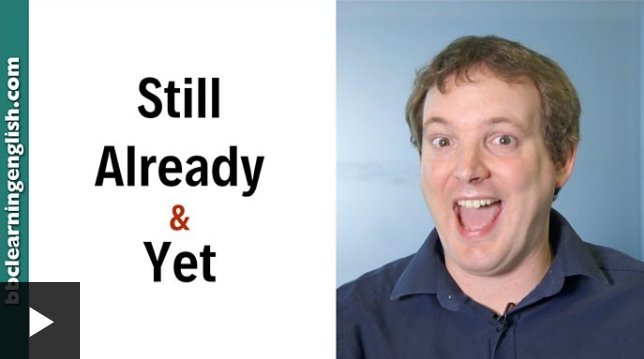Do you have a minute to spare to learn some English? Phil untangles the difficulties of still, already and yet. Give us 60 seconds and we’ll give you the English!
Phil
Hi! I’m Phil from BBC Learning English. Today, I’m going to tell you the difference between still, already and yet.
They all talk about things around the present, but they don’t mean the same.
We use still to talk about something that hasn’t finished. Are you still studying? Let’s go out!
We use already to talk about something that has finished, and maybe we didn’t think it would have by now. She’s already finished work. She’s gone home.
We use yet in questions and negatives to talk about things that haven’t happened, but we think they will. Haven’t you left yet? You’ll be late!
So just remember: Things that are still happening, haven’t finished. Things that have already happened, have finished and things that are yet to happen, haven’t started.
Are you still watching? Have you learnt this yet? You remember it already? Fantastic!
Still, already, yet
Things in common
Still, already and yet are all adverbs and can all be used to talk about things going on around the present.
Still
We use still to talk about something that hasn’t finished, which may be surprising. Still usually, but not always, goes in front of the main verb phrase.
- Are you still studying?
- He still hasn’t been to France.
- I still can’t decide what to do.
Already
We use already to talk about something that has finished, but that this was earlier than expected. Already usually, but not always, goes in front of the main verb phrase. It can also go at the end of the clause for emphasis.
- She’s already finished work.
- I’m only 18 but I’ve already been to 25 countries.
- You can’t have arrived already! I’m not even home!
Yet
We use yet in questions and negatives to talk about things that haven’t happened, but we think they will. Yet usually appears at the end of the clause.
- Haven’t you left yet?
- I haven’t met my teacher yet.
- Are we nearly there yet?
